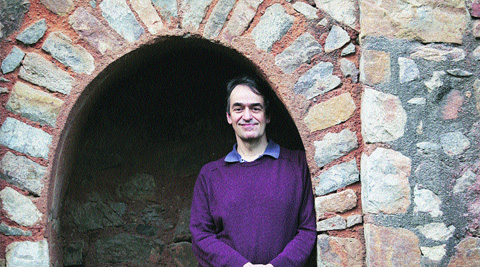Stay updated with the latest - Click here to follow us on Instagram
Journey to the East
Sam Miller’s new book shows how foreigners have represented, and misrepresented, India over 2,500 years.
It’s possible that to you, like many of us, history is a mausoleum to forgotten dates and dead people. British author Sam Miller is the kind of history teacher who could have changed your mind, and his new book, A Strange Kind of Paradise, with its mashup of emperors and YouTube, ancient explorers and 20th century sitcoms, Parsi weddings and ancient Greeks is the kind of entertaining writing that could banish boredom from any classroom. “History is amazing, it is full of extraordinary stuff that is fascinating even today,” says the 52-year-old author, who has a gripe about the tag of “popular history” that his book will surely attract. “As if it is bad history. It is not, it is accessible history,” he says.
In A Strange Kind of Paradise, Miller surveys how foreigners have perceived India over 2,500 years, from Scylax, the ancient Greek, who, not quite truthfully, found in India the Enotikoitoi — people whose ears were so large that they used them as sleeping bags — to Allen Ginsberg, who wanted to touch “real poverty” and had a wild time, “hanging out happily with burning corpses and sadhus”. “The foreigners had these often mad, and madly different, ideas of India. They would see it as an incredibly rich place, and an incredibly poor place. A spiritual as well as materialistic place. A place that was sexually free and sophisticated, and one that was sexually conservative and repressed. Sometimes, they would hold those views at the same time. My argument is that all of these things were partly true, that India was large enough for all of those things to be true,” he says.
Miller grew up in London during the ’60s and ’70s, but remained untouched by either the Raj nostalgia or the idea, post Beatles, of India as a place where one went to find free love, drugs and enlightenment. He had, he says, no sense of his Indian destiny. He was a BBC journalist in the Middle East, when he came to Bombay as a wedding guest and the boyfriend of the groom’s sister. He stayed on because he married Shireen, and the couple moved to Delhi in 1991.
As a writer on India, Miller remains determinedly sceptical of accounts that exoticise it, either as a place where sadhus take marijuana breaks on beds of nails, or as heaven on earth. His first book, Delhi: Adventures in a Megacity, saw him chase down the two stories that he insists lies down every road in India. That account of a Hindi-speaking, irrepressibly curious flaneur of Delhi was one of the first accounts to humanise this famously hard-to-love city. (When you ask him about how the city has changed, his answer, delivered with a snort of laughter, is: “Shahpur Jat has an Australian restaurant. I would not have believed it two-three years ago.”)
A Strange Kind of Paradise is an account of Miller’s perambulations through time as well as space, but it has one foot in the eccentricities of contemporary India. The book teems with stories and trivia, nuggets of history and the glimmer of factoids. The Sam Miller footnote is a genre in itself, a meta-narrative of cheeky observations and untold stories that tempt you to take off on many different paths. (How can you not YouTube a Bengali version of Peter Sarstedt’s Where Do You Go My Lovely? Or stop to laugh at the smug racism of a NYT typo, when an Indian got the Nobel for literature: “Babindranath Tagore, if not exactly one of us, is, as an Aryan, a distant relative of all white folk”.)
In its playful structure is the story of the digital reader. “If you see how many people use the internet, they zap between different things, press links, and go off in completely different directions. The footnotes are a bit, for me, like a hyperlink. That’s becoming a normal way of reading, not perhaps the only way of reading. I don’t think the linear narrative is any longer the dominant form of reading that we do in our life,” he says.
The flip side of giving the reader so much fun is that he might ignore the scholarship packed into its pages. But what leaps off the page is the generosity of this foreigner towards an often-difficult country, his acceptance of its foibles and ugliness, his passion for its history, and his love for this strange land, even on days it is not a paradise.








